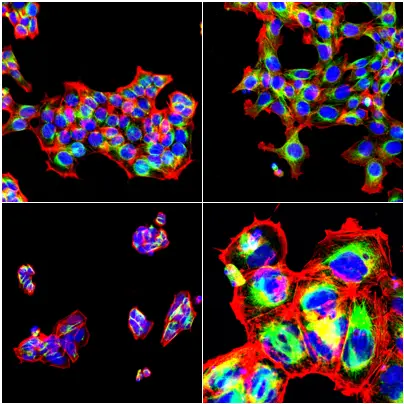The development of new drugs is a lengthy and expensive process. It is often only after a long development period that it becomes apparent that a potential new substance causes undesirable side effects and must therefore be abandoned. This also drives up costs. In the search for new drugs, thousands of substances are usually tested in parallel, but only a very small part of their biological activity is recorded. This narrow characterization of new active substances can lead to the overlooking of unrecognized mechanisms of action that could help in the treatment of other diseases.
“It would be desirable and, above all, economically sensible to comprehensively characterize new drug candidates during early preclinical development,“ said Michael Boutros from the German Cancer Research Centre (DKFZ) and the Medical Faculty Mannheim, Heidelberg University. His project “REMATCH - Image-based Analysis for Drug Discovery and Repurposing“, which is funded by the European Research Council (ERC) as a “Proof of Concept“, is aimed precisely at this goal. With this funding instrument, the Research Council supports scientists in further developing the economic potential of the results or technologies they have developed in an ongoing ERC funding project in order to implement them in spin-off companies, for example.
The idea for REMATCH came from Boutros' ERC project “SYNGENE“. It is based on software for image-based screenings developed in Boutros' department, which enables the broad and cost-effective recording of a large number of reactions of cells to active substances and the analysis of these reactions using machine learning methods.
Each test substance causes subtle changes in the structure and distribution of these biomolecules, which are made visible by fluorescence staining and documented by automated microscopy. All in all, this provides a comprehensive picture of the state of the cell,“ said Boutros explaining the principle.
However, in order to be able to interpret the biological meaning of such an image, a reference must be available to the users of the method. With REMATCH, the researchers around Boutros now want to create a reference database for such drug patterns. They are using new approaches in artificial intelligence and machine learning.
The very large data sets of the reference database are used to compare the effect of a test substance with that of already approved or failed active substances (so-called “fall angels“) in order to exclude side effects at an early stage and to explore new fields of action. The ERC funding now enables Boutros to test and initiate the economic potential of the analytical approaches and software solutions newly developed by his department as well as the possibility of a spin-off of the project.
A picture is available for download:
PM-ERC-PoC.jpg
Caption: Automated microscopy documents changes in cells after treatment with a test substance
Note on use of images related to press releases
Use is free of charge. The German Cancer Research Center (Deutsches Krebsforschungszentrum, DKFZ) permits one-time use in the context of reporting about the topic covered in the press release. Images have to be cited as follows: “M. Boutros, Deutsches Krebsforschungszentrum“.
Distribution of images to third parties is not permitted unless prior consent has been obtained from DKFZ's Press Office (phone: ++49-(0)6221 42 2854, E-mail: presse@dkfz.de). Any commercial use is prohibited.



